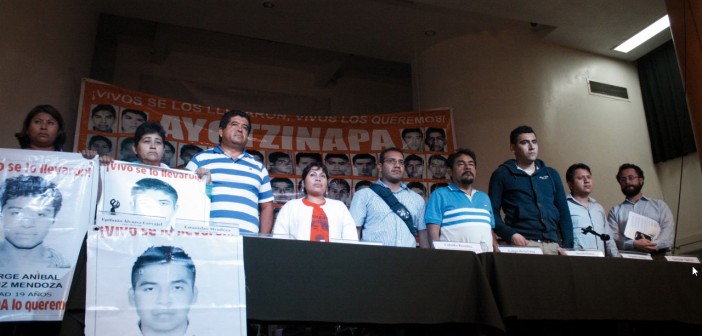Authors: Emma Buckhout, Jennifer Johnson
 On January 27th, following four months of anguished searching for their sons and growing frustration with a highly flawed government search effort and investigation, the parents of the 43 disappeared students from a rural teachers college in Ayotzinapa, Guerrero resoundingly rejected the Mexican government’s announcement that it was closing the case. The parents demanded that the government keep the case open and ensure justice for their disappeared loved ones. This call for justice has been echoed during the months of widespread protests over the disappearance of these students and the long-standing patterns of rampant corruption, collusion, impunity and violence this represents.
On January 27th, following four months of anguished searching for their sons and growing frustration with a highly flawed government search effort and investigation, the parents of the 43 disappeared students from a rural teachers college in Ayotzinapa, Guerrero resoundingly rejected the Mexican government’s announcement that it was closing the case. The parents demanded that the government keep the case open and ensure justice for their disappeared loved ones. This call for justice has been echoed during the months of widespread protests over the disappearance of these students and the long-standing patterns of rampant corruption, collusion, impunity and violence this represents.
Earlier that day, Mexican Attorney General Jesús Murillo Karam announced that authorities had closed the case following an “exhaustive, serious” investigation. Without presenting any significant new evidence, he asserted that “the students were kidnapped, killed, burned and thrown into the river.” He claimed that authorities had “legal certainty” in this case, based on recently obtained testimony from a member of the criminal organization Guerreros Unidos, and had arrested upwards of 100 people.
Moments earlier, President Peña Nieto, whose approval ratings have plummeted to an all-time low, attempted to dismiss ongoing criticism from the families of the disappeared students and human rights advocates in Mexico and around the world urging, “we cannot remain trapped in this sad moment in our history, the worst that can happen is that we become a society that misses its past, laments its present, and cries for its future.”
However, the premature closing of this case fails to address that real justice is necessary for communities, as well as the government of Mexico, to move forward from this horrific event—and many doubts remain in the Ayotzinapa case. While the government has presumed the students dead for many weeks, the students’ parents have not given up hope. They and communities across Mexico want to see that those truly responsible for the disappearance are held accountable. Accompanied by members of the Tlachinollan human rights organization, the families held their own press conference hours after the government’s announcement, laying out clear arguments about why justice would not be served by closing the case now, including:
– The team of independent forensic experts (Equipo Argentino de Antropología Forense), only positively identified the remains of one of the disappeared students;
– There are allegations that some of the testimonies obtained and cited by the Attorney General may have been obtained under torture, rendering them invalid. (See more here.)
– There are contradictions in some of the various testimonies;
– There are no unified eforced disappearance charges;
– There has been no explanation given for the student who was found dead in the streets of Iguala, separated from the rest of the group;
– There has been no investigation into the alleged involvement of the Mexican military;
– There has been no investigation into the role of nearby local authorities;
– The Mexican federal government prioritized media appearances, without sharing information with the families first.
The families further criticized the government for trying to downplay the case and the gravity of the human rights situation in Mexico. While the Mexican Attorney General stated that the disappearance of their sons was an “atypical act” in Mexico, the government’s own figures cite over 23,000 people as disappeared or missing in Mexico, though many estimates are even higher.
Despite the Mexican government’s glossiest attempts, parents and allies concerned with the protection of human rights from across Mexico and around the world will continue to scrutinize this case and call for justice. In early February, an Interdisciplinary Group of Independent Experts designated by the Inter-American Human Rights Commission will hold meetings to investigate and provide technical analysis in the case of the missing students. Earlier this week, the United Nations Committee on Enforced Disappearance evaluated Mexico’s compliance with its obligations under the International Convention for the Protection for All Persons against Forced Disappearance.
LAWG joins the parents, international and Mexican human rights groups, and communities across Mexico and around the world in urging authorities in Mexico to address the demands of the parents and ensure justice for the disappeared students, a critical step towards addressing a much greater crisis of disappearance and rebuilding the social fabric of Mexico.

